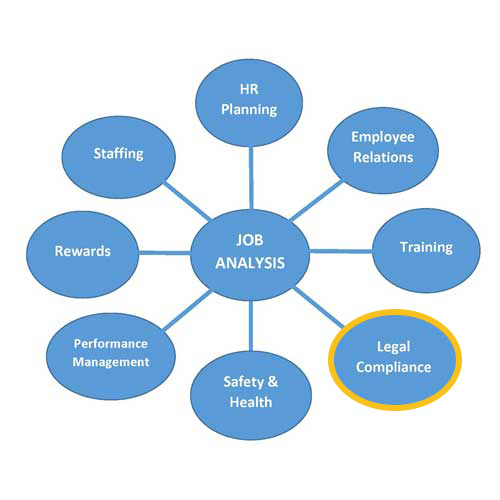
We know that a Job/Task Analysis (JTA) is a study that identifies the skill and knowledge requirements needed by employees to perform their jobs. JTAs are specific to each individual job and are often used as the underlying documentation needed for employment practices to comply with legal guidelines. A good JTA will incorporate a single set of principles designed to assist employers in complying with the requirements of Federal Law prohibiting discriminatory practices relating to entrance tests, promotions, and training.
Federal guidelines apply to tests and other employment selection procedures that are used as a basis for any employment decision. These employment decisions include, but are not limited to:
- Hiring practices
- Entrance test construction, validation, and cut-off scores
- Evaluating an employment candidate’s prior training and experience
- Promotions
- Use of selection procedures for higher level jobs
- Training and cross-training
- Classifying and re-classifying employees
In 1978, the EEOC adopted the Uniform Guidelines on Employee Selection Procedures (or Guidelines) under Title VII (see 29 CFR Part 1607). UGESP provides uniform guidance for employers about how to determine if their tests and selection procedures are lawful for purposes of Title VII’s Disparate Impact theory.
The Guidelines outline three different ways employers can prove their employment tests and other selection criteria are job-related. The methods of demonstrating job-relatedness are called test validation. The Guidelines give detailed guidance about each test validation method.
Federal EEO laws specifically state that it is not an unlawful employment practice for an employer to give and to act upon the results of any professionally developed ability or psychological test, provided that such test, its administration, and action based upon the results is not designed, intended, or used to discriminate because of race, color, religion, sex, or national origin.
The federal government advocates employment testing procedures that emphasize these elements:
- A careful job analysis to define skill and knowledge requirements related to the performance of the specific job.
- Tests selected on the basis of specific job-related criteria.
In addition to entrance tests, all activities in employee selection, including promotions, are required by 41 CFR 60 to be related to a study that consists of empirical data demonstrating that the selection procedure is predictive of or significantly correlated with important elements of the specific job performance. A JTA consists of data showing the identifiable characteristics that have been determined to be important in successful performance of the job for which the candidates are to be evaluated.
According to 41 CFR 60-3.14C (2): There should be a job analysis which includes an analysis of the important work behaviors required for successful performance and their relative importance…A job analysis should focus on the work behavior(s) and the tasks associated with them.
A good JTA will identify specific skills and knowledge requirements that are important to a given job. When measuring a knowledge requirement, the knowledge being measured should be operationally defined as that body of learned information which is used in and is a necessary prerequisite for observable aspects of work behavior on the job. This is also true for skills and abilities identified by the JTA; they must be operationally defined in terms of observable aspects of work behavior on the job.
From the results of the JTA, recommendations can then be made for entrance testing, performance testing, and the employment decisions previously described.
The importance of a Job/Task Analysis (JTA) is well recognized. It is used as the underlying documentation needed for employment practices to comply with legal guidelines, and to assist employers in complying with the requirements of Federal Law prohibiting discriminatory practices relating to employment decisions. The JTA data can also be used to structure training programs and is crucial to organizations that are downsizing, restructuring, and consolidating jobs.
Stay tuned for next week’s topic on how JTA data is useful for HR PLANNING.
Contact Bill Salter today at wsalter@techtransfer.com and see what we can do for you!

